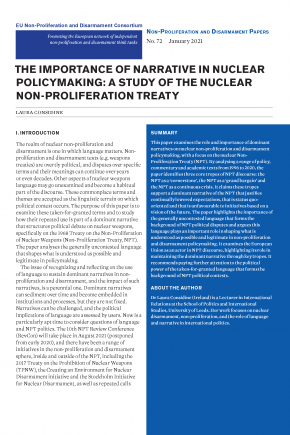The Importance of Narrative in Nuclear Policymaking: A Study of the Nuclear Non-Proliferation Treaty
This paper examines the role and importance of dominant narratives on nuclear non-proliferation and disarmament policymaking, with a focus on the nuclear Non-Proliferation Treaty (NPT). By analysing a range of policy, commentary and academic texts from 1996 to 2020, the paper identifies three core tropes of NPT discourse: the NPT as a ‘cornerstone’, the NPT as a ‘grand bargain’ and the NPT as a continuous crisis. It claims these tropes support a dominant narrative of the NPT that justifies continually lowered expectations, that is status quo-oriented and that is unfavourable to initiatives based on a vision of the future. The paper highlights the importance of the generally uncontested language that forms the background of NPT political disputes and argues this language plays an important role in shaping what is understood as possible and legitimate in non-proliferation and disarmament policymaking. It examines the European Union as an actor in NPT discourse, highlighting its role in maintaining the dominant narrative through key tropes. It recommends paying further attention to the political power of the taken-for-granted language that forms the background of NPT political contests.
I. Introduction
II. Narrative in international politics
III. Narrative in nuclear policymaking
IV. The Non-Proliferation Treaty narrative
V. Conclusions

